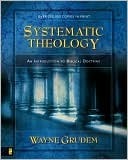More on this book
Community
Kindle Notes & Highlights
by
Wayne Grudem
Read between
December 9, 2016 - April 27, 2017
Furthermore, whenever we add to the list of sins that are prohibited by Scripture itself, there will be harm to the church and to the lives of individual believers. The Holy Spirit will not empower obedience to rules that do not have God’s approval from Scripture, nor will believers generally find delight in obedience to commands that do not accord with the laws of God written on their hearts. In some cases, Christians may repeatedly and earnestly plead with God for “victory” over supposed sins that are in fact no sins at all, yet no “victory” will be given, for the attitude or action in
...more
2. In Genesis 1:31, when God finished his work of creation, we read, “And God saw everything that he had made, and behold, it was very good.” But according to the gap theory, God would be looking at an earth full of the results of rebellion, conflict, and terrible divine judgment. He would also be looking at all the demonic beings, the hosts of Satan who had rebelled against him, and yet be calling everything “very good.” It is difficult to believe that there was so much evil and so many evidences of rebellion and judgment on the earth, and that God could still say that creation was very good.
To both, Calvinists would say that the answer is somehow to be found in an awareness of God’s infinite greatness, in the knowledge of the fact that he can do far more than we could ever think possible. So the effect of these unanswered questions is to increase our appreciation of the greatness of God. On the other hand, Arminians must leave unanswered questions regarding God’s knowledge of the future, why he would allow evil when it is against his will, and whether he will certainly triumph over evil. Their failure to resolve these questions tends to diminish the greatness of God — his
...more
This means that praying “in Jesus’ name” is not only praying in his authority, but also praying in a way that is consistent with his character, that truly represents him and reflects his manner of life and his own holy will.
This is significant because in the old covenant, the sign of membership of God’s people was circumcision, which was given only to men. The new sign of membership of God’s people, the sign of baptism, given to both men and women, is further evidence that both should be seen as fully and equally members of the people of God.
Yet it certainly is possible for God to bring regeneration (that is, new spiritual life) to an infant even before he or she is born. This was true of John the Baptist, for the angel Gabriel, before John was born, said, “He will be filled with the Holy Spirit, even from his mother’s womb” (Luke 1:15). We might say that John the Baptist was “born again” before he was born! There is a similar example in Psalm 22:10: David says, “Since my mother bore me you have been my God.” It is clear, therefore, that God is able to save infants in an unusual way, apart from their hearing and understanding the
...more
But the question remains, “How then could Jesus’ temptations be real?” The example of the temptation to change the stones into bread is helpful in this regard. Jesus had the ability, by virtue of his divine nature, to perform this miracle, but if he had done it, he would no longer have been obeying in the strength of his human nature alone, he would have failed the test that Adam also failed, and he would not have earned our salvation for us. Therefore, Jesus refused to rely on his divine nature to make obedience easier for him. In like manner, it seems appropriate to conclude that Jesus met
...more
But this analogy with the members of the Trinity is very important for another reason: it warns us against thinking that union with Christ will ever swallow up our individual personalities. Even though the Father, Son, and Holy Spirit have perfect and eternal unity, yet they remain distinct persons. In the same way, even though we shall someday attain perfect unity with other believers and with Christ, yet we shall forever remain distinct persons as well, with our own individual gifts, abilities, interests, responsibilities, circles of personal relationships, preferences, and desires.


